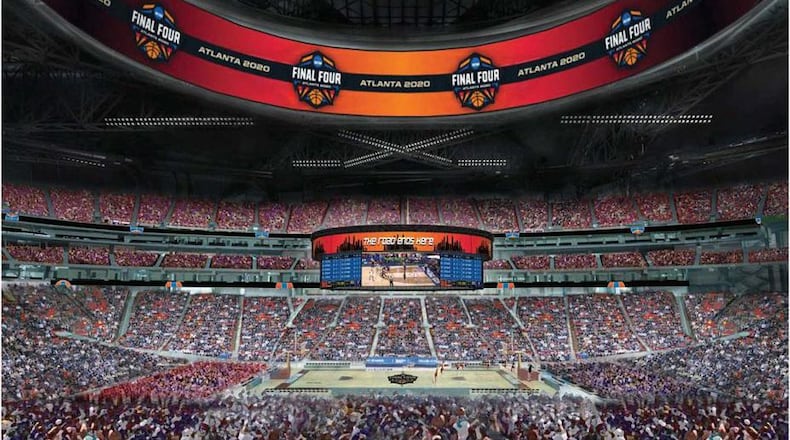Six years ago, when Mercedes-Benz Stadium was in the early stages of construction, Atlanta secured the 2020 Final Four for the then-unnamed building.
“Before the stadium was even built, we pictured a basketball court out there and some 80,000-plus seats for the Final Four,” Scott Jenkins, the stadium’s general manager, said last month. “It was contemplated right from the beginning.”
Now, of course, it won’t happen — for at least seven more years.
“We’re going to have to wait a little bit to check that box,” Steve Cannon, CEO of Arthur Blank’s group of businesses, which include the stadium, said Friday.
The NCAA's decision Thursday to cancel its men's and women's basketball tournaments because of the coronavirus pandemic came three days before 1,000 workers were scheduled to begin a two-week makeover of Mercedes-Benz Stadium for the men's Final Four.
“In light of everything that is going on, the NCAA made the right call,” Cannon said. “From our standpoint, I won’t lie to you, we’re disappointed because we felt Mercedes-Benz Stadium and the city of Atlanta really shined so brightly through (hosting) the college football championship game and the Super Bowl. We’re always eager when we get the opportunity to put our stadium and city on a national and global stage, and the Final Four was that stage.
“But in light of the circumstances, we support the NCAA and think they made a hard but correct decision.”
Because the Final Four is committed to other cities from 2021-26, the earliest Mercedes-Benz Stadium can get another opportunity to host the event is 2027. Atlanta Sports Council President Dan Corso said the city plans to submit a bid when the NCAA begins the process next year of choosing sites for 2027-31.
“It’s disappointing that we’re not going to see (the 2020 Final Four) to fruition,” Corso said, “but at the end of the day I know our planning was sound and our reputation and partnership with the NCAA remains sound. Quite frankly, I think that was enhanced over the last 24 to 48 hours (before cancellation) in the way our team worked with the NCAA.
“We look forward to continuing the next part of this journey with them in the future,” Corso said.
Before the cancellation decision, work had been scheduled to begin in earnest Sunday on converting Mercedes-Benz Stadium to a basketball venue for the first time. Some 11,000 seats were to have been removed from the lower bowl, hauled away for storage off-site and replaced with 25,000 temporary seats in a new configuration. A basketball court was to have been installed in the middle of the field, with seats extending to court-side. A 140,000-pound scoreboard was to have been hung above center court.
Instead of that buzz of activity, the massive stadium will go quiet for at least the next month or so.
No event is scheduled there until some small private functions April 17. The next public event in the stadium depends on when Atlanta United's season resumes; MLS has suspended play for at least 30 days.
For now, the stadium’s administrative offices are closed and will get a deep cleaning, Cannon said. Most employees will work remotely for at least two weeks. Hourly employees will reportedly be paid during that time.
Some modifications of the stadium for the Final Four had begun before the cancellation, including preliminary steps to black out exterior light for basketball and engineering work in the rafters to prepare for the center-hung scoreboard required by the NCAA.
“But the real effort was going to begin almost immediately after the Atlanta United match (originally scheduled for Saturday),” Cannon said. “So in that regard the (timing of the NCAA’s) call saved us a fair amount of conversion costs.”
The Final Four was to have completed a series of three mega-events in the stadium over a 28-month period, following the College Football Playoff championship game in January 2018 and the Super Bowl in February 2019.
“One thing I’m not concerned about is that Mercedes-Benz Stadium will continue to attract the best and biggest events on the planet,” Cannon said Friday. “The combination of what Atlanta has to offer with the airport and the downtown and the stadium and MARTA and ‘walkability’ — it really is unrivaled when it comes to hosting big events. So while we’re disappointed in the short term, we’re very convinced that in the long run we’re going to get our disproportionate share of these kind of events.
“Just as soon as we can get back in line for the Final Four, we’re going to jump right back in line. We’re going to jump back in line for the Super Bowl, too. We’re waiting on confirmation of (the stadium’s role) when it comes to the World Cup (in 2026).”
About the Author
Keep Reading
The Latest
Featured

